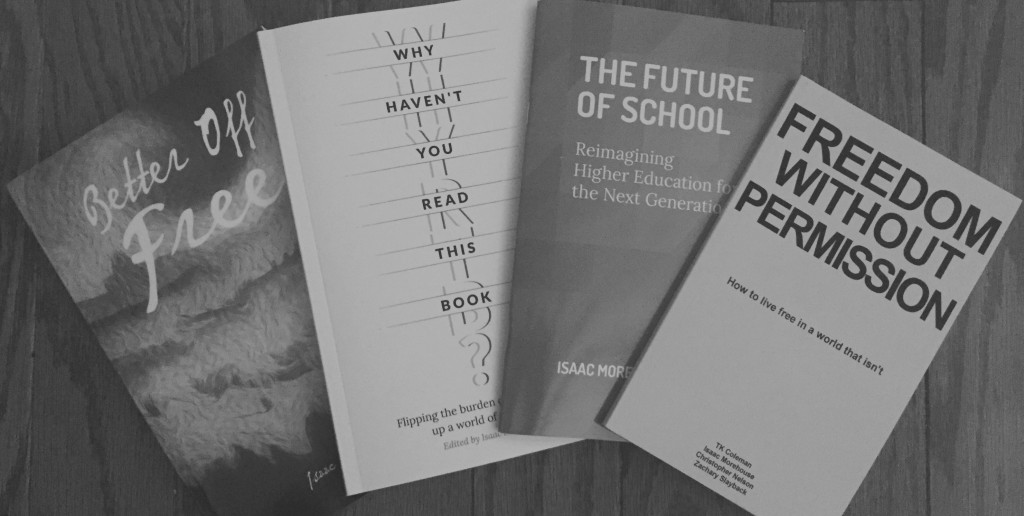Alright, my good friend and Praxis colleague TK Coleman convinced me to share this personal recap in a blog post after I shared it with him in an email. It feels a little weird or narcissistic, but I guess a little reflection is permitted this time of year. Besides, I had nothing to write today and I’m not going to miss my daily post!
Praxis is the main driver of my activities and goals, and our continued growth, amazing network of business partners, totally awesome alumni and participants, and expanded offerings (about to be announced!) make me proud of what we’ve done in 2015 and excited about 2016. Beyond the business, I also have a few personal goals, all still very much related to my mission of freedom and progress.
What was my 2015 like? Mostly laying groundwork and exploring new ways to create. Here’s some of the stuff I accomplished that I’m most proud of:
- Blogged every day.
- Launched a podcast and released 64 episodes with 40 different guests.
- Started writing on Medium and gained over 250,000 article views and more than 5,900 followers.
- Did more than 30 (can’t remember exact number) of interviews on podcasts, news outlets, etc.
- Gave more than 20 presentations in 15 cities.
- Published two more books, bringing the total to four.
- Recorded a song for the first time ever!
- Read about 30 books.
- Travelled with the family to Florida and Pittsburgh, and spent a week in Jamaica with my wife.
- Published in more than 20 different outlets.
- Launched a monthly newsletter.
- Gained more than 2,000 new social media followers.
- Ran a successful KickStarter campaign raising $5,379 for a $4,850 goal.
- Booked a six-week trip to Ecuador for the family.
- Ruthlessly removed even more stuff from my life leaving me less stressed and less crunched for time than I’ve ever been.
- Had a total reach of 491,652 though the podcast, blog, and articles I have data for. (This one gets me. My goal for the year was 500,000.)*
I certainly had some shortcomings in 2015. I missed my goal to do one form of exercise a day probably 5% of the time (which is embarrassing when you realize I consider even a few pushups sufficient.) Though I hit my daily blogging goal, too many days I churned out something less than what I think I could have in terms of quality. I didn’t read as many books as I wanted to, and almost no fiction, which I planned to read a lot of.
Most of all, I feel like my efforts at being a good, peaceful, calm unschooling dad fell short in everything but theory. I now know clearly what kind of parent I want to be and why (both huge improvements over the last few years trying to figure it out), but I still struggle every single day to translate that head knowledge into daily habits and behaviors. Hopefully my kids are as resilient as I suspect they are.
Again in 2016 Praxis is the focus. Outside of my family, it’s what I live and breathe and I’ll be focusing even more tightly on our goals for the business and everything we stand for. I do have a few personal goals I’m thinking about for the year ahead as well. Possibly another book, growing the podcast, perhaps changing up my writing routine to do longer pieces weekly instead of shorter posts daily (still trying to decide on this one), etc.
Regardless, thanks to every single one of you who has read, clicked, liked, shared, listened, commented, loved, critiqued, and even openly hated what I’ve been creating. I’ve always said I do this for me, but I’d be lying if I didn’t say it feels great to connect with people over the ideas I love!
(In case you’re wondering, by far the most popular piece in 2015 was this article on why playing LEGO is better than learning algebra. The most popular podcast episode was this interview with my son on being unschooled.)
*UPDATE: 12/31/15 – For unknown reasons, a few old posts of mine got picked up again and generated a ton of views right after I wrote this. Just after noon on December 31, I broke the 500,000 mark. Here’s to a goal being met!


